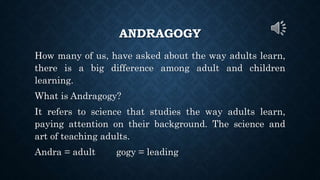Andragogy jose maria
- 1. UNIVERSIDAD AUTONOMA DEL ESTADO DE MEXICO ENSEÃANZA DEL INGLES PARA ADULTOS ASESOR: CLAUDIA DOMINGUEZ MEDINA ALUMNO: JOSÃ MARÃA AGUILAR SÃNCHEZ â ANDRAGOGY â AGOSTO 2018
- 2. ANDRAGOGY How many of us, have asked about the way adults learn, there is a big difference among adult and children learning. What is Andragogy? It refers to science that studies the way adults learn, paying attention on their background. The science and art of teaching adults. Andra = adult gogy = leading
- 3. History: It started around 1833 by Alexander Knapp (first studies) Rosenstock 1921 Eduard Linderman 1926 Malcom Knowles 1980, a well known educator started the formal studies to create a Theory. He states that âAdult groups become a laboratory of democracyâ
- 4. ASSUMPTIONS 1. The need to know: Adults become aware of what they are trying to do, the reason they are learning and the risks they can take, something important they set up their own goals and respond positively.
- 5. Self Concept: Adults become responsible and they do the best to acquire the target point, they do not pay attention to barriers.
- 6. Experience: it is part of them, they have enough experience to face new challenges, they see experience as a tool. That tool is associated with knowledge acquired during their lives.
- 7. Readiness to learn: As children, adults get excited when they see the opportunity to learn something new. Something that is important is that they share their new knowledge with friends and family. They focus on the direction they are taking and see if they need any assistance.
- 8. Orientation to learn: They observe carefully and reflect what they have learn, it is the point when they develop concepts.
- 9. Motivation: It is crucial for their on development and progress, most of the time intrinsic motivation is observed and they really want to show their progress matureness plays an important role for this feature.
- 10. Andragogy says that adults are special and of course their teachers, trainers should know that they are working with people in some cases older than them, and they need to look for the correct strategies and techniques to teach adults in order to reach adults' goals.
- 11. FEATURES ABOUT ADULT LEARNERS âĒ Experience and knowledge âĒ Goals â aims â objectives âĒ Collaborative âĒ Self â conscious âĒ Dependent âĒ Motivation âĒ Mature
- 12. It is impossible to teach adults in the same way we teach adults, do not use the same techniques and strategies. Adults are voluntary learners with goals on mind. Adults make their own decisions and take and face their consequences and resist learning conditions.
- 13. Andragogy = Adult Education
- 14. ADULTS LEARNERS NEEDâĶ âĒ Their own experience to face new challenges. âĒ Problem centered. âĒ To be involved in every single stage of their learning process. âĒ They really want to know Why! âĒ Task oriented instead of memorization. âĒ Instructions help them to be independent.
- 15. SITUATIONS OF LEARNING There is an attractive learning environment which helps adults to acquire the knowledge. (freedom is seen). Goals are reached. Participation in all aspects of the learning process. The adults feel a need to learn. There is a sense of progress.
- 17. REFERENCES Retrived from: https://www.nationalcollege.org.uk/cm-andragogy.pdf https://lincs.ed.gov/sites/default/files/11_%20TEAL_Adult_Learni ng_Theory.pdf Knowles, M. S. (1984)Andragogy in Action. Applying Modern Principles of Adult Learning. San Francisco: Jossey-Bass.
















